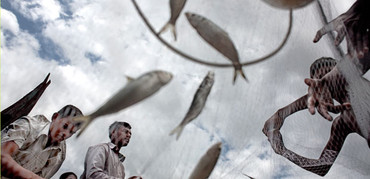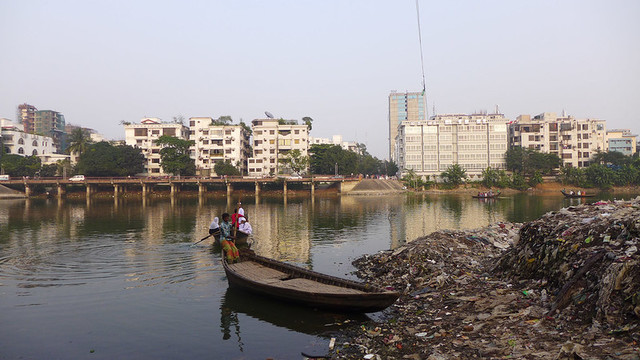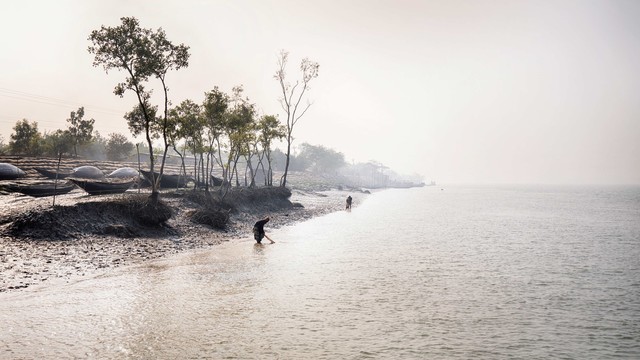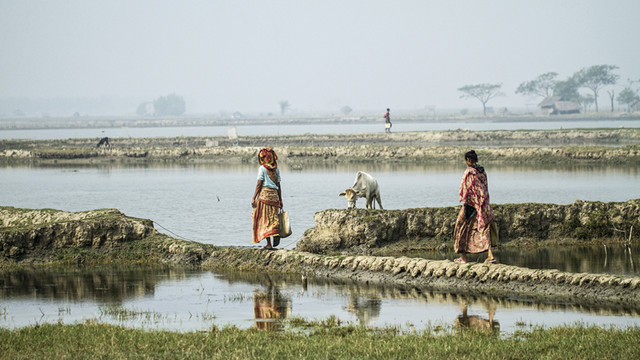Conservation trust fund proposed to help manage Bangladesh fish stocks
Proposals for a new Hilsa Conservation Trust Fund that aims to relieve the financial burden from the government and help bridge the finance gap were discussed by Bangladesh fisheries officials and researchers and practitioners on 11 June.

Delegates discuss the Hilsa Conservation Trust Fund at the Bangladesh workshop. The fund is part of work to enhance the effectiveness of incentive-based fisheries management (Photo: Essam Yassin Mohammed/IIED)
On Thursday, 11 June, at the Westin Dhaka hotel, officials from the Department of Fisheries welcomed researchers, practitioners and representatives from the Government of Bangladesh, including the Honourable Minister of Fisheries and Livestock, Mr Muhammed Sayedul Hoque, and the Secretary of the Ministry of Fisheries and Livestock, Dr Shelina Afroza, to discuss proposals for a new Hilsa Conservation Trust Fund that aims to relieve the financial burden from the government and help bridge the finance gap.
The important meeting brought in learnings from a review of conservation trust funds from across the world, and extensively discussed the background document that sets out the business case, and the memorandum and articles of association of the proposed trust fund, as well as defining the key milestones from proposal to implementation stages.
This is part of the effort being made by the three-year Darwin Initiative-funded research project between the International Institute for Environment and Development (IIED), the Bangladesh Centre for Advanced Studies (BCAS), the Bangladesh Agricultural University (BAU) and the Department of Fisheries to make recommendations for ways to enhance the effectiveness of the incentive-based fisheries management.
The Honourable Minister said: "I express my gratitude to the Darwin-Hilsa project for taking this initiative. Establishment of the Hilsa Conservation Trust Fund is very timely when our hilsa fishery is under pressure of exploitation due to increase of population and climate change effects."
Hilsa (Tenualosa ilisha) is one of the most important single-species fisheries in the Bay of Bengal. More than half a million people depend on it for their livelihood and 250 million Bengali people depend on it for nutrition.
But in the face of over-exploitation, scientists and policymakers feared a collapse of the fish stock in the near future, which led the Bangladeshi government to declare five sites in the fishing grounds as 'hilsa sanctuaries', where fishing is banned during the breeding season. To compensate for lost earnings, the government provides 'affected' fisher communities, which total more than 200,000 households, with food and alternative income-generating activities.
Dr Essam Yassin Mohammed, a senior researcher with IIED, said: "The Government of Bangladesh is rare in that it recognised the impact of restricted fishing activities on fisher households and moved to compensate them. The government's actions are unique in that they have now been running this compensation without any external assistance for over 10 years, for which they should be commended."
The Honourable Minister added: "I hope that the workshop would discuss the Hilsa Conservation Trust Fund documents critically and recommend appropriate measures for improvement. Following this workshop, a revised draft document of the trust fund will be submitted to the Department of Fisheries for review and submit to the Ministry of Fisheries and Livestock for further action.
"I give you assurance that all possible measures will be taken by the Ministry of Fisheries and Livestock for establishment of the Hilsa Conservation Trust Fund in Bangladesh for sustainable development, conservation and management of our national fish."
In another development on 3-4 June, Dr Syed Arif Azad, director general of the Department of Fisheries flew to Brussels to speak on the importance of the Darwin-Hilsa project lessons for Bangladesh and other country governments, at the European Development Days Forum, alongside researchers from IIED and BAU.

Dr Azad said: "It was important for the Department of Fisheries to share Bangladesh's unique learnings on fisheries management. We welcome the learnings from this research project and look forward to using them to make the government scheme even more effective in the future."
The project team also officially submitted both the background document and the memorandum and articles of association of the Hilsa Conservation Trust Fund.
Dr Azad said: "We will take these recommendations seriously and I hope they will enable us to improve the effectiveness and efficiency of the incentive-based scheme for hilsa management. We will continue to work with IIED and other development partners to pursue the ratification process of the proposed Hilsa Conservation Trust Fund. We hope to see it up and running."
Additional information
Lessons on the social targeting of the compensation scheme and the biophysical study of hilsa fishery include:
- In order for compensation project to be able to achieve its social objectives, more emphasis on 'vulnerable and fishing dependent households' is needed
- The targeting strategy needs more clarity. Currently the criteria for selection are complex and less transparent for the fishing community. This will allow the fishers to view the compensation distribution as fair and be more likely to comply with the rules
- Efforts need to be made to improve the water quality and quantity in the sanctuaries. Recommendations include: tackling pollution from industrial and domestic effluents, more dredging to minimise siltation, and regulate river diversion in upstream areas
- While the current scheme bans jatka (juvenile hilsa) fishing for eight months during November to June, jatka fishing should be banned throughout the year, and
- The current scheme bans hilsa brood (adult) fishing for just 11 days during the full moon of the month of Ashvin (October). Our study on the reproductive cycle of hilsa indicates that spawning peak for hilsa more than 11 days. Therefore, the ban should be extended to at least 30 days, which may affect compensation levels.




